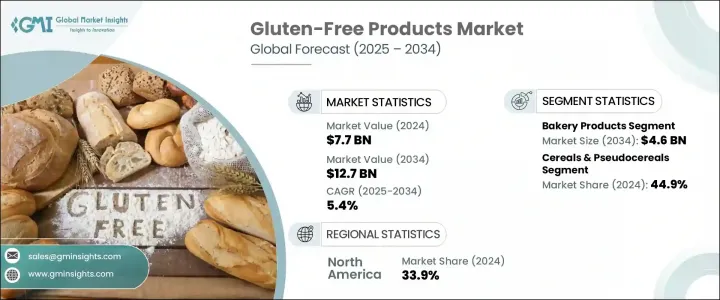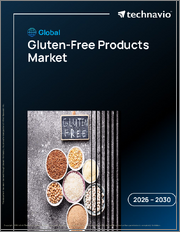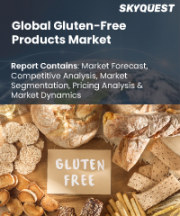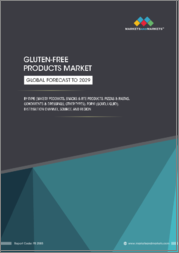
|
시장보고서
상품코드
1782119
무글루텐 제품 시장 : 시장 기회, 성장 촉진요인, 산업 동향 분석, 예측(2025-2034년)Gluten-Free Products Market Opportunity, Growth Drivers, Industry Trend Analysis, and Forecast 2025 - 2034 |
||||||
세계의 무글루텐 제품 시장 규모는 2024년에 77억 달러로 평가되었고, CAGR 5.4%로 성장할 전망이며, 2034년에는 127억 달러에 이를 것으로 추정됩니다.
이 시장 확대의 주요 요인은 글루텐 관련 건강 문제에 대한 소비자의 의식 증가 및 세리악병 환자뿐만 아니라 건강 지향이 높은 소비자까지 무글루텐 식생활을 채용하는 경향이 강해지고 있다는 것입니다. 무글루텐 제품은 건강상의 이점을 인정하고 글루텐 불내성의 사람들이 증가하고 있기 때문에 세계에서 인기를 얻고 있습니다. 이 시장은 베이커리 제품, 스낵 과자, 음료, 조리된 식품 등 다양한 소비자 요구에 부응하는 다양한 제품을 다루고 있습니다. 게다가 무글루텐 제품은 슈퍼마켓, 전문점, 하이퍼마켓, 온라인 스토어 등 여러 소매 채널을 통해 입수할 수 있어 시장의 추가 성장을 추진하고 있습니다.

무글루텐 제품은 보통 쌀, 옥수수, 키누아 및 기타 무글루텐 곡물과 같은 원료로 만들어졌으며 보다 건강하고 알레르겐이 없는 대체품으로 인기를 끌고 있습니다. 이 시장은 의학적으로 무글루텐 식이요법이 필요한 사람들부터 보다 광범위한 건강법의 일환으로 자발적으로 무글루텐 라이프스타일을 채택하는 사람들에 이르기까지 광범위한 소비자를 수용합니다. 세리악병과 글루텐 과민증 환자뿐만 아니라 건강 지향 소비자의 대부분은 더 깨끗하고 가볍고 소화에 좋다는 무글루텐 제품을 인식하고 있습니다. 이러한 소비자 의식의 변화는 지병이 없는 사람들 사이에서도 무글루텐 대체 식품에 대한 수요를 높이고 있습니다.
| 시장 범위 | |
|---|---|
| 시작 연도 | 2024년 |
| 예측 연도 | 2025-2034년 |
| 시작 금액 | 77억 달러 |
| 예측 금액 | 127억 달러 |
| CAGR | 5.4% |
베이커리 분야는 2034년까지 46억 달러에 이를 전망이며, CAGR 5.5%로 성장이 예상됩니다. 이 분야는 밀 대체물에 대한 수요가 증가함에 따라 무글루텐 시장에서 강한 지위를 차지합니다. 생산자는 소비자의 기대에 부응하기 때문에 풍미, 식감, 영양가를 높이는 데 주력하고 있습니다. 무글루텐 원료나 제조에 드는 비용이 높기 때문에 가격 설정이나 시장 진입에 과제가 있지만, 아몬드나 코코넛과 같은 대체 밀가루를 사용하는 등의 기술 혁신이 이러한 장벽의 극복에 도움이 되고 있습니다.
2024년 현재, 시리얼 및 의사 시리얼 분야는 44.9%의 점유율을 차지하였고, 2034년까지 CAGR 5.2%로 성장이 예측됩니다. 이 분야는 쌀, 옥수수, 키누아, 메밀과 같은 무글루텐 곡물이 베이커리 제품, 스낵 과자, 조리된 식품을 포함한 많은 제품 카테고리에서 널리 사용되는 것이 견인 역할을 하며 여전히 주요 공헌자가 되고 있습니다. 영양이 풍부하고 기능적인 식품에 대한 소비자 수요가 증가함에 따라 제조업체는 이러한 원료를 사용하여 새롭고 혁신적인 제품을 개발할 것을 촉구합니다.
북미의 무글루텐 제품 2024년 시장 점유율은 33.9%였습니다. 이 지역이 선도하는 것은 건강 의식 증가와 글루텐 불내증 및 세리악병의 높은 유병률 때문입니다. 미국은 견조한 식품 산업과 확립된 무글루텐 제품 제조업체에 의해 지원되며 북미 내에서 주요 공헌국이 되고 있습니다. 무글루텐의 명확한 표시를 의무화하는 규제 조치도 소비자의 신뢰를 높이고 있습니다. 반면 캐나다는 무글루텐 베이커리 및 스낵 제품에 대한 수요가 증가하고 있으며 중요한 역할을 하고 있습니다.
무글루텐 제품 시장은 경쟁이 심하고 Kellogg's Company, Enjoy Life Foods, General Mills, Dr. Schar, and Conagra Brands 등 주요 기업이 시장의 상당 부분을 차지하고 있습니다. 무글루텐 제품 시장에서 발판을 굳히기 위해 기업은 몇 가지 중요한 전략에 주력하고 있습니다. 여기에는 진화하는 소비자의 기대에 부응하기 위해 맛, 식감, 영양가 향상을 목표로 한 지속적인 제품 혁신이 포함됩니다.
알레르겐이 없거나 깨끗한 라벨 옵션으로 제품 포트폴리오를 확장하면 건강 지향 구매자를 수용할 수 있습니다. 기업은 무글루텐 음식의 건강상의 이점을 강조하는 마케팅 캠페인에 투자하여 광범위한 소비자를 끌어들입니다. 또한 소매 업체와 제휴하고 온라인 판매 플랫폼을 강화하여 유통 채널을 확대하여 시장에 도달할 수 있게 하고 있습니다. 또한 전략적 합병 및 인수를 통해 기업은 지리적 존재와 제품 라인업을 확대하고 급성장하는 이 분야에서 전반적인 경쟁력을 높이고 있습니다.
목차
제1장 조사 방법 및 범위
제2장 주요 요약
제3장 업계 인사이트
- 생태계 분석
- 공급자의 상황
- 이익률
- 각 단계에서의 부가가치
- 밸류체인에 영향을 주는 요인
- 혁신
- 영향요인
- 성장 촉진요인
- 세리악병 및 글루텐 과민증의 유병률 상승
- 건강 및 웰빙 의식의 고조
- 무글루텐 제품의 맛과 식감 향상
- 소매 유통 및 제품의 가용성 확대
- 업계의 잠재적 위험 및 과제
- 무글루텐 제품의 프리미엄 가격
- 원하는 식감과 맛을 실현하기 위한 과제
- 시장 기회
- 제품의 혁신 및 다양화
- 신흥 시장으로 확대
- 전자상거래 및 소비자 직접 판매 채널
- 클린 라벨 및 오가닉 무글루텐 제품
- 성장 촉진요인
- 성장 가능성 분석
- 규제 상황
- Porter's Five Forces 분석
- PESTEL 분석
- 가격 동향
- 지역별
- 제품 유형별
- 장래 시장 동향
- 기술 및 혁신의 상황
- 특허 상황
- 무역 통계(HS코드)(참고 : 무역 통계는 주요 국가에서만 제공됨)
- 주요 수입국
- 주요 수출국
- 지속가능성 및 환경 측면
- 지속가능한 관행
- 폐기물 감축 전략
- 생산에서 에너지 효율
- 환경 친화적인 노력
제4장 경쟁 구도
- 서문
- 기업의 시장 점유율 분석
- 지역별
- 북미
- 유럽
- 아시아태평양
- 라틴아메리카
- 중동 및 아프리카
- 지역별
- 기업 매트릭스 분석
- 주요 시장 기업의 경쟁 분석
- 경쟁 포지셔닝 매트릭스
- 주요 발전
- 합병 및 인수
- 파트너십 및 협업
- 신제품 발매
- 확장 계획
제5장 시장 추계 및 예측 : 제품 유형별(2021-2034년)
- 주요 동향
- 베이커리 제품
- 빵 및 롤빵
- 케이크 및 패스트리
- 쿠키 및 비스킷
- 머핀 및 컵케이크
- 기타 베이커리 제품
- 파스타 및 쌀 제품
- 파스타 및 국수
- 쌀 제품
- 기타 곡물 제품
- 스낵 및 RTE 식품
- 풍미 풍부한 스낵
- 에너지 및 단백질 바
- 칩과 크리스프
- 인스턴트 식품 및 인스턴트 식품
- 기타 스낵 및 RTE 식품
- 유제품 및 유제품 대체품
- 요구르트 및 발효 식품
- 아이스크림 및 냉동 디저트
- 치즈 및 치즈 대체품
- 기타 유제품 및 대체품
- 음료
- 알코올 음료
- 무알코올 음료
- 조미료, 드레싱, 소스
- 베이비 푸드 및 유아용 조제 분유
- 기타
제6장 시장 추계 및 예측 : 공급원별(2021-2034년)
- 주요 동향
- 곡물 및 의사곡물
- 쌀베이스
- 옥수수 베이스
- 키누아베이스
- 기장베이스
- 수수 베이스
- 기타 곡물 및 의사곡물원
- 콩류
- 병아리콩 베이스
- 렌틸콩 베이스
- 콩 베이스
- 기타 콩류
- 견과류 및 씨앗
- 아몬드 베이스
- 코코넛 베이스
- 기타 견과류 및 종자류
- 괴경 및 뿌리
- 감자 베이스
- 타피오카 및 카사바 베이스
- 기타 괴경 및 근원
- 기타
제7장 시장 추계 및 예측 : 유통 채널별(2021-2034년)
- 주요 동향
- 전문점 및 건강식품점
- 편의점
- 온라인 소매
- 전자상거래 플랫폼
- 소비자 직접 판매 웹사이트
- 구독 서비스
- 약국 및 드럭스토어
- 푸드서비스 및 HoReCa
- 기타
제8장 시장 추계 및 예측 : 소비자 그룹별(2021-2034년)
- 주요 동향
- 세리악병 환자
- 비세리악성 글루텐 과민증
- 밀 알레르기 환자
- 건강 및 웰빙 소비자
- 기타
제9장 시장 추계 및 예측 : 지역별(2021-2034년)
- 주요 동향
- 북미
- 미국
- 캐나다
- 유럽
- 독일
- 영국
- 프랑스
- 스페인
- 이탈리아
- 기타 유럽
- 아시아태평양
- 중국
- 인도
- 일본
- 호주
- 한국
- 기타 아시아태평양
- 라틴아메리카
- 브라질
- 멕시코
- 아르헨티나
- 기타 라틴아메리카
- 중동 및 아프리카
- 사우디아라비아
- 남아프리카
- 아랍에미리트(UAE)
- 기타 중동 및 아프리카
제10장 기업 프로파일
- Boulder Brands
- Cerealto
- Conagra Brands
- Dr. Schar
- Enjoy Life Foods
- General Mills
- Glutafin
- Hero Group
- Kellogg's Company
- Pinnacle Foods
- Prima Foods
- Seitz Glutenfrei
- Silky Yay Foods
- True Foods
- Wheafree
The Global Gluten-Free Products Market was valued at USD 7.7 billion in 2024 and is estimated to grow at a CAGR of 5.4% to reach USD 12.7 billion by 2034. This expansion is primarily fueled by rising consumer awareness of gluten-related health issues and the growing trend of adopting gluten-free diets beyond just individuals with celiac disease, extending to health-conscious consumers. Gluten-free offerings have gained popularity worldwide due to their perceived health advantages and the increasing number of people with gluten intolerance. The market covers a wide variety of products such as bakery goods, snacks, beverages, and ready-to-eat meals, which cater to diverse consumer needs. Furthermore, the availability of gluten-free products has broadened significantly through multiple retail channels like supermarkets, specialty shops, hypermarkets, and online stores, driving further market growth.

Gluten-free products are typically made from ingredients like rice, corn, quinoa, and other gluten-free grains, which are gaining traction as healthier and allergen-free alternatives. This market caters to a wide spectrum of consumers, from individuals medically required to follow gluten-free diets to those who voluntarily adopt such lifestyles as part of a broader wellness regimen. Beyond those with celiac disease and gluten sensitivity, many health-conscious consumers perceive gluten-free products as cleaner, lighter, and better for digestion. This growing shift in consumer mindset has fueled demand for gluten-free alternatives even among those without medical conditions.
| Market Scope | |
|---|---|
| Start Year | 2024 |
| Forecast Year | 2025-2034 |
| Start Value | $7.7 Billion |
| Forecast Value | $12.7 Billion |
| CAGR | 5.4% |
The bakery segment is expected to reach USD 4.6 billion by 2034, growing at a CAGR of 5.5%. This segment holds a strong position within the gluten-free market due to rising demand for wheat alternatives. Producers are focusing on enhancing flavor, texture, and nutritional value to meet consumer expectations. Although higher costs associated with gluten-free ingredients and manufacturing present challenges in pricing and market reach, innovations such as using alternative flours like almond and coconut are helping to overcome these barriers.
In 2024, the cereals and pseudocereals segment held a 44.9% share and is projected to grow at a CAGR of 5.2% through 2034. This segment remains a major contributor, driven by the widespread use of gluten-free grains like rice, corn, quinoa, and buckwheat in numerous product categories, including bakery items, snacks, and ready meals. The rising consumer demand for nutrient-rich and functional foods is encouraging manufacturers to develop new and innovative products featuring these ingredients.
North America Gluten-Free Products Market held a 33.9% share in 2024. This region leads due to increasing health awareness and a higher prevalence of gluten intolerance and celiac disease. The United States is a major contributor within North America, supported by a robust food industry and established gluten-free product manufacturers. Regulatory measures requiring clear gluten-free labeling have also enhanced consumer confidence. Meanwhile, Canada plays an important role with a growing demand for gluten-free bakery and snack products.
The Gluten-Free Products Market is highly competitive, with leading companies such as Kellogg's Company, Enjoy Life Foods, General Mills, Dr. Schar, and Conagra Brands collectively holding a substantial portion of the market. To strengthen their foothold in the gluten-free products market, companies focus on several key strategies. These include continuous product innovation aimed at improving taste, texture, and nutritional benefits to meet evolving consumer expectations.
Expanding product portfolios with allergen-free and clean-label options helps cater to health-conscious buyers. Firms invest in marketing campaigns that highlight the health advantages of gluten-free diets to attract a broader audience. They also emphasize expanding distribution channels by partnering with retail giants and enhancing online sales platforms for better market reach. Additionally, strategic mergers and acquisitions enable companies to increase their geographic presence and product offerings, boosting overall competitiveness in this fast-growing sector.
Table of Contents
Chapter 1 Methodology & Scope
- 1.1 Market scope & definitions
- 1.2 Base estimates & calculations
- 1.3 Forecast calculations
- 1.4 Data sources
- 1.4.1 Primary
- 1.4.2 Secondary
- 1.4.2.1 Paid sources
- 1.4.2.2 Public sources
Chapter 2 Executive Summary
- 2.1 Industry synopsis, 2021-2034
Chapter 3 Industry Insights
- 3.1 Industry ecosystem analysis
- 3.1.1 Supplier Landscape
- 3.1.2 Profit Margin
- 3.1.3 Value addition at each stage
- 3.1.4 Factor affecting the value chain
- 3.1.5 Disruptions
- 3.2 Impact forces
- 3.2.1 Growth drivers
- 3.2.1.1 Rising prevalence of celiac disease & gluten sensitivity
- 3.2.1.2 Growing health & wellness consciousness
- 3.2.1.3 Improved taste & texture of gluten-free products
- 3.2.1.4 Expanding retail distribution & product availability
- 3.2.2 Industry pitfalls & challenges
- 3.2.2.1 Premium pricing of gluten-free products
- 3.2.2.2 Challenges in achieving desired texture & taste
- 3.2.3 Market opportunities
- 3.2.3.1 Product innovation & diversification
- 3.2.3.2 Expansion in emerging markets
- 3.2.3.3 E-commerce & direct-to-consumer channels
- 3.2.3.4 Clean label & organic gluten-free products
- 3.2.1 Growth drivers
- 3.3 Growth potential analysis
- 3.4 Regulatory landscape
- 3.5 Porter’s analysis
- 3.6 PESTEL analysis
- 3.7 Price trends
- 3.7.1 By region
- 3.7.2 By product type
- 3.8 Future market trends
- 3.9 Technology and Innovation landscape
- 3.10 Patent Landscape
- 3.11 Trade statistics (HS code) (Note: the trade statistics will be provided for key countries only)
- 3.11.1 Major importing countries
- 3.11.2 Major exporting countries
- 3.12 Sustainability and environmental aspects
- 3.12.1 Sustainable practices
- 3.12.2 Waste reduction strategies
- 3.12.3 Energy efficiency in production
- 3.12.4 Eco-friendly initiatives
Chapter 4 Competitive Landscape, 2024
- 4.1 Introduction
- 4.2 Company market share analysis
- 4.2.1 By region
- 4.2.1.1 North America
- 4.2.1.2 Europe
- 4.2.1.3 Asia Pacific
- 4.2.1.4 LATAM
- 4.2.1.5 MEA
- 4.2.1 By region
- 4.3 Company matrix analysis
- 4.4 Competitive analysis of major market players
- 4.5 Competitive positioning matrix
- 4.6 Key developments
- 4.6.1 Mergers & acquisitions
- 4.6.2 Partnerships & collaborations
- 4.6.3 New product launches
- 4.6.4 Expansion plans
Chapter 5 Market Estimates & Forecast, By Product Type, 2021-2034 (USD Billion) (Kilo Tons)
- 5.1 Key trends
- 5.2 Bakery products
- 5.2.1 Bread & rolls
- 5.2.2 Cakes & pastries
- 5.2.3 Cookies & biscuits
- 5.2.4 Muffins & cupcakes
- 5.2.5 Other bakery products
- 5.3 Pasta & rice products
- 5.3.1 Pasta & noodles
- 5.3.2 Rice-based products
- 5.3.3 Other grain-based products
- 5.4 Snacks & RTE foods
- 5.4.1 Savory snacks
- 5.4.2 Energy & protein bars
- 5.4.3 Chips & crisps
- 5.4.4 Ready meals & convenience foods
- 5.4.5 Other snacks & RTE foods
- 5.5 Dairy & dairy alternatives
- 5.5.1 Yogurt & fermented products
- 5.5.2 Ice cream & frozen desserts
- 5.5.3 Cheese & cheese alternatives
- 5.5.4 Other dairy & alternatives
- 5.6 Beverages
- 5.6.1 Alcoholic beverages
- 5.6.2 Non-alcoholic beverages
- 5.7 Condiments, dressings & sauces
- 5.8 Baby food & infant formula
- 5.9 Others
Chapter 6 Market Estimates & Forecast, By Source, 2021-2034 (USD Billion) (Kilo Tons)
- 6.1 Key trends
- 6.2 Cereals & pseudocereals
- 6.2.1 Rice-based
- 6.2.2 Corn-based
- 6.2.3 Quinoa-based
- 6.2.4 Millet-based
- 6.2.5 Sorghum-based
- 6.2.6 Other cereal & pseudocereal sources
- 6.3 Pulses & legumes
- 6.3.1 Chickpea-based
- 6.3.2 Lentil-based
- 6.3.3 Bean-based
- 6.3.4 Other pulse & legume sources
- 6.4 Nuts & seeds
- 6.4.1 Almond-based
- 6.4.2 Coconut-based
- 6.4.3 Other nut & seed sources
- 6.5 Tubers & roots
- 6.5.1 Potato-based
- 6.5.2 Tapioca/cassava-based
- 6.5.3 Other tuber & root sources
- 6.6 Others
Chapter 7 Market Estimates & Forecast, By Distribution Channel, 2021-2034 (USD Billion) (Kilo Tons)
- 7.1 Key trends
- 7.2 Specialty stores & health food stores
- 7.3 Convenience stores
- 7.4 Online retail
- 7.4.1 E-commerce platforms
- 7.4.2 Direct-to-consumer websites
- 7.4.3 Subscription services
- 7.5 Pharmacies & drugstores
- 7.6 Foodservice & HoReCa
- 7.7 Others
Chapter 8 Market Estimates & Forecast, By Consumer Group, 2021-2034 (USD Billion) (Kilo Tons)
- 8.1 Key trends
- 8.2 Celiac disease patients
- 8.3 Non-celiac gluten sensitivity
- 8.4 Wheat allergy patients
- 8.5 Health & wellness consumers
- 8.6 Others
Chapter 9 Market Estimates & Forecast, By Region, 2021-2034 (USD Billion) (Kilo Tons)
- 9.1 Key trends
- 9.2 North America
- 9.2.1 U.S.
- 9.2.2 Canada
- 9.3 Europe
- 9.3.1 Germany
- 9.3.2 UK
- 9.3.3 France
- 9.3.4 Spain
- 9.3.5 Italy
- 9.3.6 Rest of Europe
- 9.4 Asia Pacific
- 9.4.1 China
- 9.4.2 India
- 9.4.3 Japan
- 9.4.4 Australia
- 9.4.5 South Korea
- 9.4.6 Rest of Asia Pacific
- 9.5 Latin America
- 9.5.1 Brazil
- 9.5.2 Mexico
- 9.5.3 Argentina
- 9.5.4 Rest of Latin America
- 9.6 MEA
- 9.6.1 Saudi Arabia
- 9.6.2 South Africa
- 9.6.3 UAE
- 9.6.4 Rest of Middle East and Africa
Chapter 10 Company Profiles
- 10.1 Boulder Brands
- 10.2 Cerealto
- 10.3 Conagra Brands
- 10.4 Dr. Schar
- 10.5 Enjoy Life Foods
- 10.6 General Mills
- 10.7 Glutafin
- 10.8 Hero Group
- 10.9 Kellogg’s Company
- 10.10 Pinnacle Foods
- 10.11 Prima Foods
- 10.12 Seitz Glutenfrei
- 10.13 Silky Yay Foods
- 10.14 True Foods
- 10.15 Wheafree


















